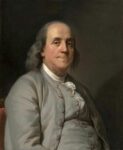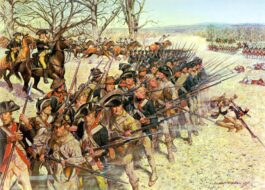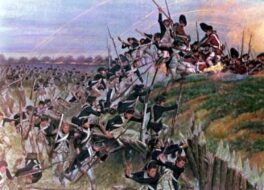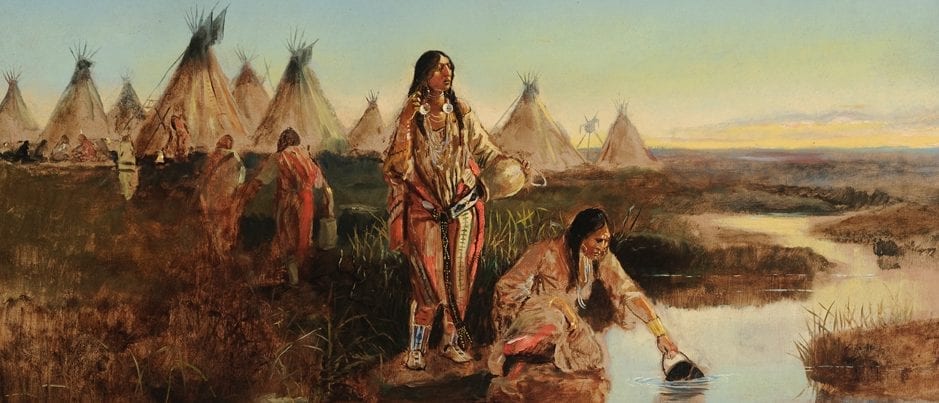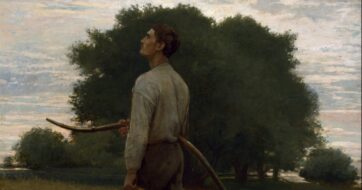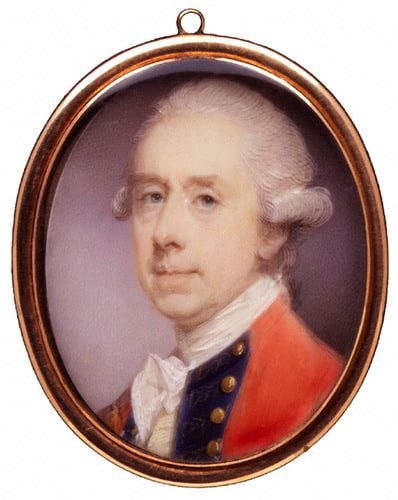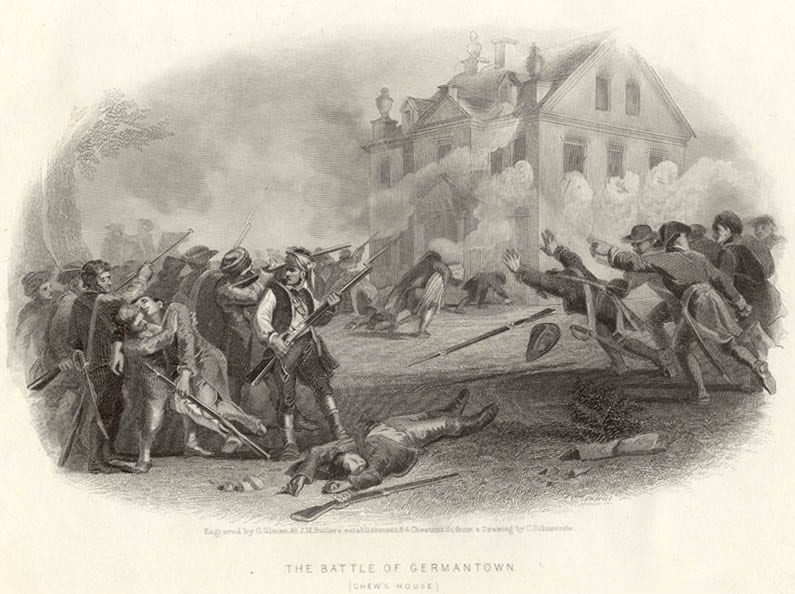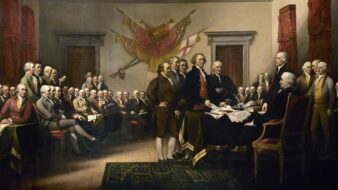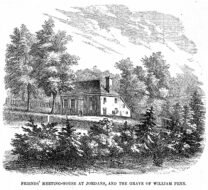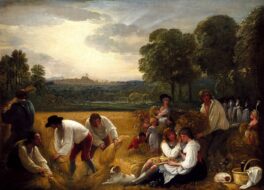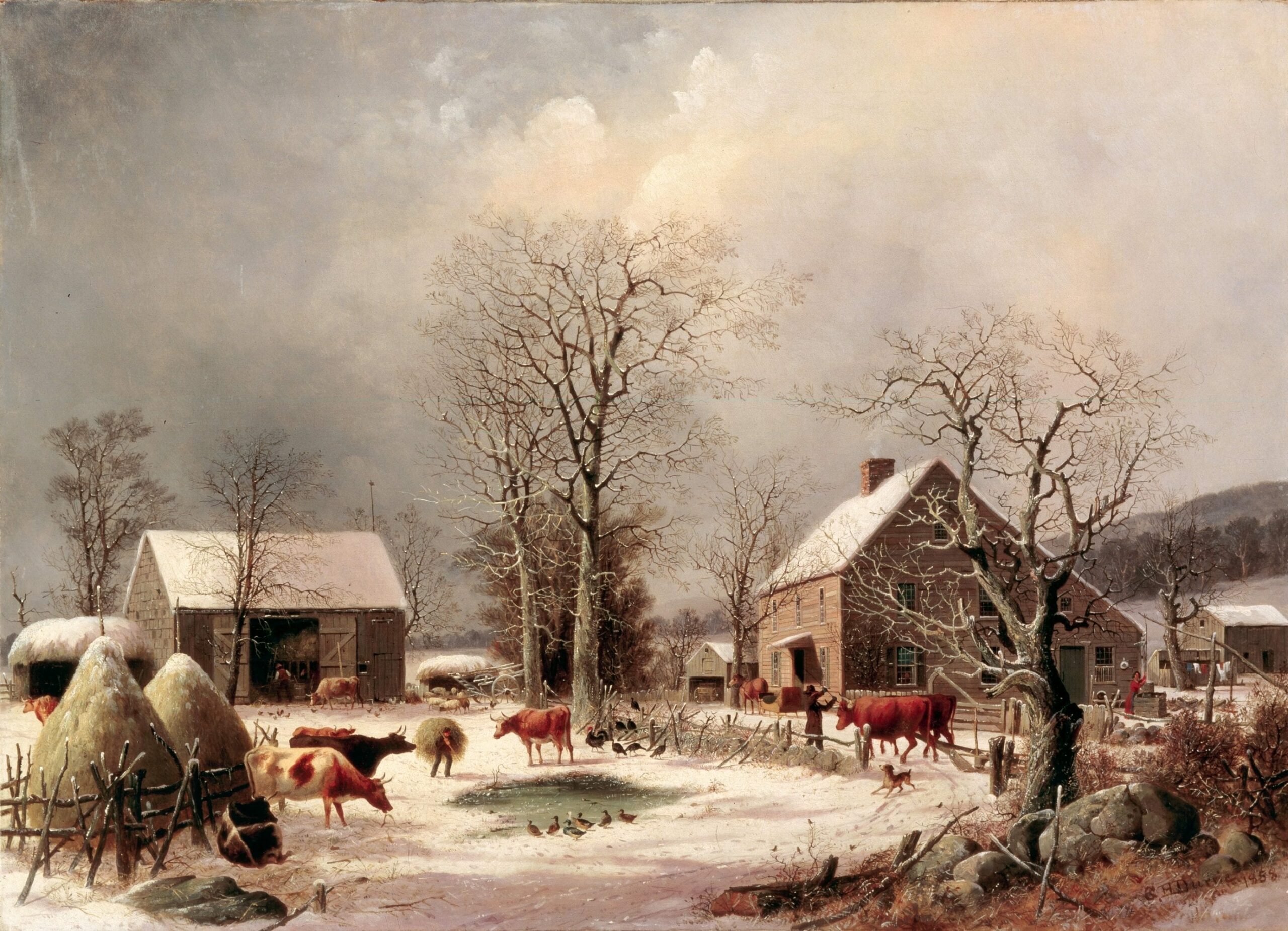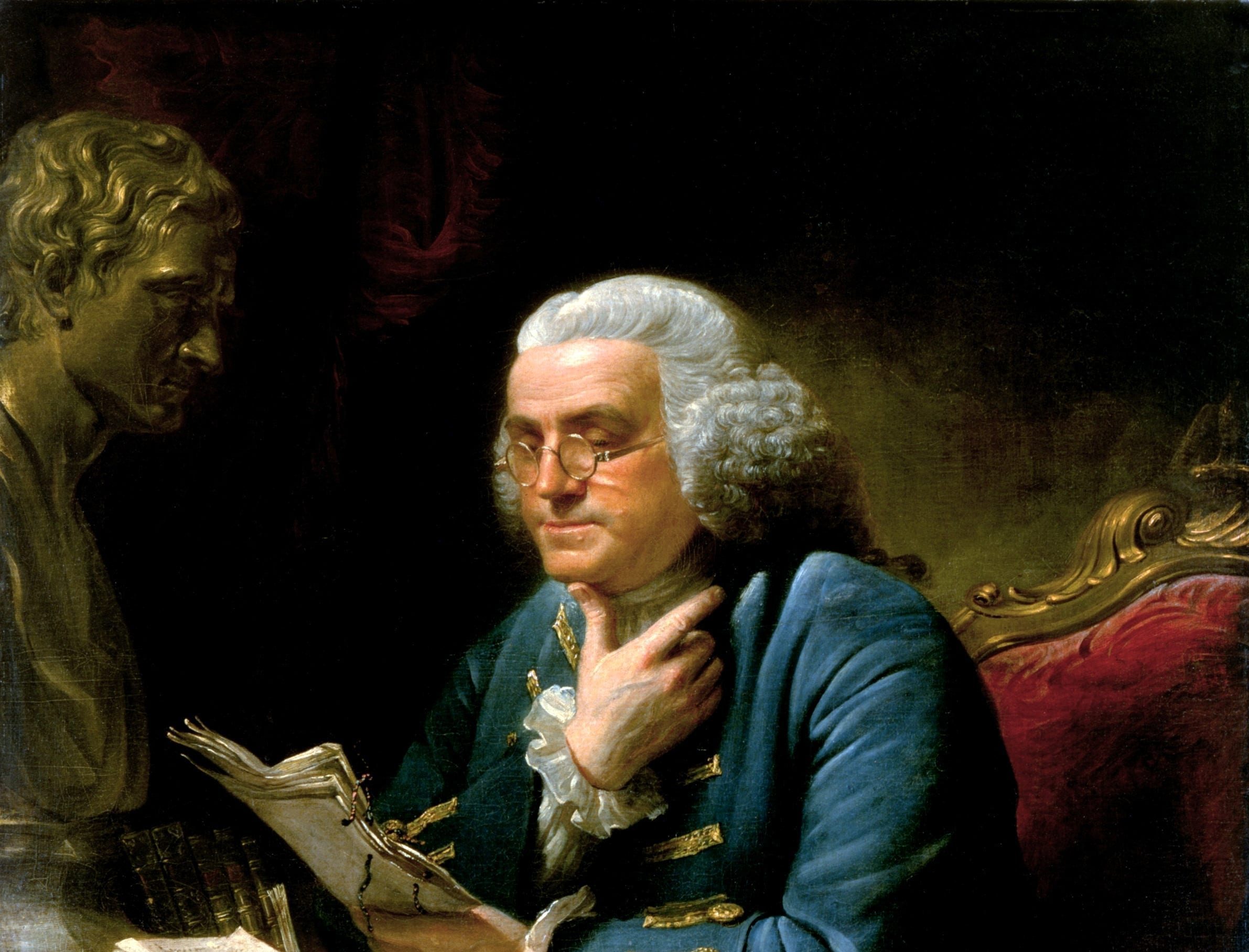
Introduction
As the Continental Congress moved towards and then declared Independence, it became increasingly important to consider those who would (and would not) benefit from the new nation’s commitment to the proposition of human equality. Abigail Adams (Document A) urged her husband to consider the rights of women; Thomas Jefferson (Document D) recognized that the existing institution of slavery presented not only a theoretical but a moral conundrum that would plague the young nation; religious minorities, like the Jewish Synagogue members in Philadelphia, asserted their right to be included as well (Document E). The principles of the Declaration—life, liberty, and the pursuit of happiness—seemed as though they should be open to all.
As John Adams and Benjamin Rush observed (Documents A and F), the very headiness of freedom might prove to be the new nation’s downfall. While in theory liberty and equality were open to all, for the sake of political prudence, the number of those who enjoyed full civil rights had to be more limited in practice. Rush appealed not only to prudence but to Providence, observing that these principles were only secure when the citizenry were firm in their commitment to virtue, and would otherwise become dangerous.
Documents in this chapter are available separately by following the hyperlinks below:
- John Adams' Correspondence, March 31–May 26, 1776
- Celebrations of American Independence in Boston and Watertown, Mass., July 18, 1776
- To The Honorable Counsel & House of Representatives for the State of Massachusetts Bay in General Court assembled, January 13, 1777
- <a href="#-
-Thomas-Jefferson,-Notes-on-the-State-of-Virginia,-1781–17828
-">Thomas Jefferson, Notes on the State of Virginia, 1781–1782 - Petition of the Philadelphia Synagogue to the Council of Censors of Pennsylvania, December 23, 1783
- <a href="#-
Benjamin-Rush,-An-Enquiry-Into-the-Effects-of-Spirituous-Liquors-upon-the-Human-Body,-and-their-Influence-upon-the-Happiness-of-Society,-178411
-">Benjamin Rush, An Enquiry Into the Effects of Spirituous Liquors upon the Human Body, and their Influence upon the Happiness of Society, 1784
John Adams' Correspondence, March 31 – May 26, 17761
Abigail Adams to John Adams | Braintree, Mass., March 31, 1776
I wish you would ever write me a letter half as long as I write you; and tell me if you may where your fleet are gone? What sort of defense Virginia can make against our common enemy? Whether it is so situated as to make an able defense? Are not the gentry lords and the common people vassals, are they not like the uncivilized natives Britain represents us to be? I hope their riflemen, who have shown themselves very savage and even bloodthirsty, are not a specimen of the generality of the people.
I am willing to allow the colony great merit for having produced a Washington but they have been shamefully duped by a Dunmore.2
I have sometimes been ready to think that the passion for liberty cannot be equally strong in the breasts of those who have been accustomed to deprive their fellow creatures of theirs. Of this I am certain that it is not founded upon that generous and Christian principle of doing to others as we would that others should do unto us. . . .
I long to hear that you have declared an independency—and by the way in the new code of laws which I suppose it will be necessary for you to make I desire you would remember the ladies, and be more generous and favorable to them than your ancestors. Do not put such unlimited power into the hands of the husbands. Remember all men would be tyrants if they could. If particular care and attention is not paid to the ladies we are determined to foment a rebellion, and will not hold ourselves bound by any laws in which we have no voice, or representation.
That your sex are naturally tyrannical is a truth so thoroughly established as to admit of no dispute, but such of you as wish to be happy willingly give up the harsh title of master for the more tender and endearing one of friend. Why then, not put it out of the power of the vicious and the lawless to use us with cruelty and indignity with impunity. Men of sense in all ages abhor those customs which treat us only as the vassals of your sex. Regard us then as beings placed by providence under your protection and in imitation of the Supreme Being make use of that power only for our happiness. . . .
John Adams to Abigail Adams | Philadelphia, April 14, 1776
. . . . As to your extraordinary code of laws, I cannot but laugh. We have been told that our struggle has loosened the bands of government everywhere. That children and apprentices were disobedient—that schools and colleges were grown turbulent that Indians slighted their guardians and Negroes grew insolent to their masters. But your letter was the first intimation that another tribe more numerous and powerful than all the rest were grown discontented. This is rather too coarse a compliment but you are so saucy, I won’t blot it out.
Depend upon it, we know better than to repeal our masculine systems. Although they are in full force, you know they are little more than theory. We dare not exert our power in its full latitude. We are obliged to go fair, and softly, and in practice you know we are the subjects. We have only the name of masters, and rather than give up this, which would completely subject us to the despotism of the petticoat, I hope General Washington, and all our brave heroes would fight. I am sure every good politician would plot, as long as he would against despotism, empire, monarchy, aristocracy, oligarchy, or ochlocracy.3 A fine story indeed. I begin to think the ministry as deep as they are wicked. After stirring up Tories, land-jobbers, trimmers, bigots, Canadians, Indians, Negroes, Hanoverians, Hessians, Russians, Irish Roman Catholics, Scotch renegades, at last they have stimulated them to demand new privileges and threaten to rebel.
Abigail Adams to John Adams | Braintree, Mass., May 7, 1776
How many are the solitary hours I spend, ruminating upon the past, and anticipating the future, whilst you overwhelmed with the cares of state, have but few moments you can devote to any individual. All domestic pleasures and enjoyments are absorbed in the great and important duty you owe your country “for our country is as it were a secondary God, and the first and greatest parent. It is to be preferred to parents, wives, children, friends and all things the Gods only accepted. For if our country perishes it is as impossible to save an individual, as to preserve one of the fingers of a mortified hand.”4 Thus do I suppress every wish, and silence every murmur, acquiescing in a painful separation from the companion of my youth, and the friend of my heart. . . .
A government of more stability is much wanted in this colony, and they are ready to receive it from the hands of the congress, and since I have begun with maxims of state I will add another: that a people may let a king fall, yet still remain a people, but if a king let his people slip from him, he is no longer a king. And as this is most certainly our case, why not proclaim to the world in decisive terms your own importance?
Shall we not be despised by foreign powers for hesitating so long at a word?
I cannot say that I think you very generous to the ladies, for whilst you are proclaiming peace and good will to men, emancipating all nations, you insist upon retaining an absolute power over wives. But you must remember that arbitrary power is like most other things which are very hard, very liable to be broken—and notwithstanding all your wise laws and maxims we have it in our power not only to free ourselves but to subdue our masters, and without violence throw both your natural and legal authority at our feet –
Charm by accepting, by submitting sway
Yet have our humor most when we obey. . . .
John Adams to James Sullivan | Philadelphia, May 26, 1776
Your favors of May 9th. and 17th. are now before me; and I consider them as the commencement of a correspondence, which will not only give me pleasure, but may be of service to the public, as, in my present station I stand in need of the best intelligence, and the advice of every gentleman of abilities and public principles, in the colony which has seen fit to place me here.
Our worthy friend, Mr. Gerry, has put into my hand, a letter from you, of the sixth of May, in which you consider the principles of representation and legislation, and give us hints of some alterations, which you seem to think necessary, in the qualification of voters.
I wish, sir, I could possibly find time, to accompany you, in your investigation of the principles upon which a representative assembly stands and ought to stand, and in your examination whether the practice of our colony, has been conformable to those principles. But alas! Sir, my time is so incessantly engrossed by the business before me that I cannot spare enough, to go through so large a field: and as to books, it is not easy to obtain them here, nor could I find a moment to look into them, if I had them.
It is certain in theory, that the only moral foundation of government is the consent of the people. But to what an extent shall we carry this principle? Shall we say, that every individual of the community, old and young, male and female, as well as rich and poor, must consent, expressly to every act of legislation? No, you will say. This is impossible. How then does the right arise in the majority to govern the minority, against their will? Whence arises the right of the men to govern women, without their consent? Whence the right of the old to bind the young, without theirs.
But let us first suppose, that the whole community of every age, rank, sex, and condition, has a right to vote. This community, is assembled—a motion is made and carried by a majority of one voice. The minority will not agree to this. Whence arises the right of the majority to govern, and the obligation of the minority to obey? From necessity, you will say, because there can be no other rule. But why exclude women? You will say, because their delicacy renders them unfit for practice and experience, in the great business of life, and the hardy enterprises of war, as well as the arduous cares of state. Besides, their attention is so much engaged with the necessary nurture of their children, that nature has made them fittest for domestic cares. And children have not judgment or will of their own. True. But will not these reasons apply to others? Is it not equally true, that men in general in every society, who are wholly destitute of property, are also too little acquainted with public affairs to form a right judgment, and too dependent upon other men to have a will of their own? If this is a fact, if you give to every man, who has no property, a vote, will you not make a fine encouraging provision for corruption by your fundamental law? Such is the frailty of the human heart, that very few men, who have no property, have any judgment of their own. They talk and vote as they are directed by some man of property, who has attached their minds to his interest.
Upon my word, sir, I have long thought an army, a piece of clock work and to be governed only by principles and maxims, as fixed as any in mechanics, and by all that I have read in the history of mankind, and in authors, who have speculated upon society and government, I am much inclined to think, a government must manage a society in the same manner; and that this is machinery too.
Harrington has shown that power always follows property. This I believe to be as infallible a maxim, in politicks, as, that action and re-action are equal, is in mechanics. Nay I believe we may advance one step farther and affirm that the balance of power in a society, accompanies the balance of property in land. The only possible way then of preserving the balance of power on the side of equal liberty and public virtue, is to make the acquisition of land easy to every member of society: to make a division of the land into small quantities, so that the multitude may be possessed of landed estates. If the multitude is possessed of the balance of real estate, the multitude will have the balance of power, and in that case the multitude will take care of the liberty, virtue, and interest of the multitude in all acts of government.
I believe these principles have been felt, if not understood in the Massachusetts Bay, from the beginning: And therefore I should think that wisdom and policy would dictate in these times, to be very cautious of making alterations. Our people have never been very rigid in scrutinizing into the qualifications of voters, and I presume they will not now begin to be so. But I would not advise them to make any alteration in the laws, at present, respecting the qualifications of voters.
Your idea, that those laws, which affect the lives and personal liberty of all, or which inflict corporal punishment, affect those, who are not qualified to vote, as well as those who are, is just. But, so they do women, as well as men, children as well as adults. What reason should there be, for excluding a man of twenty years, eleven months and twenty-seven days old, from a vote when you admit one, who is twenty-one? The reason is, you must fix upon some period in life, when the understanding and will of men in general is fit to be trusted by the public. Will not the same reason justify the state in fixing upon some certain quantity of property, as a qualification?
The same reasoning, which will induce you to admit all men, who have no property, to vote, with those who have, for those laws, which affect the person will prove that you ought to admit women and children: for generally speaking, women and children, have as good judgment, and as independent minds as those men who are wholly destitute of property: these last being to all intents and purposes as much dependent upon others, who will please to feed, clothe, and employ them, as women are upon their husbands, or children on their parents.
As to your idea, of proportioning the votes of men in money matters, to the property they hold, it is utterly impracticable. There is no possible way of ascertaining, at any one time, how much every man in a community, is worth; and if there was, so fluctuating is trade and property, that this state of it, would change in half an hour. The property of the whole community, is shifting every hour, and no record can be kept of the changes.
Society can be governed only by general rules. Government cannot accommodate itself to every particular case, as it happens, nor to the circumstances of particular persons. It must establish general, comprehensive regulations for cases and persons. The only question is, which general rule, will accommodate most cases and most persons.
Depend upon it, sir, it is dangerous to open so fruitful a source of controversy and altercation, as would be opened by attempting to alter the qualifications of voters. There will be no end of it. New claims will arise. Women will demand a vote. Lads from 12 to 21 will think their rights not enough attended to, and every man, who has not a farthing, will demand an equal voice with any other in all acts of state. It tends to confound and destroy all distinctions, and prostrate all ranks, to one common level.
Back to TopCelebrations of American Independence in Boston and Watertown, Massachusetts, July 18, 17765
Thursday last, pursuant to the orders of the honorable council, was proclaimed, from the balcony of the State House in Boston, the DECLARATION of the AMERICAN CONGRESS, absolving the United Colonies from their allegiance to the British crown, and declaring them FREE and INDEPENDENT STATES. There were present on the occasion, in the council chamber, the committee of council, a number of the honorable House of Representatives, the magistrates, ministers, selectmen, and other gentlemen of Boston and the neighboring towns; also the committee of officers of the Continental regiments stationed in Boston, and other officers. Two of those regiments were under arms in King Street, formed into three lines on the north side of the street, and in thirteen divisions; and a detachment from the Massachusetts Regiment of Artillery, with two pieces of cannon was on their right wing. At one o’clock the Declaration was proclaimed by the sheriff of the county of Suffolk, which was received with great joy expressed by three huzzahs from the concourse of people assembled on the occasion. After which, on a signal given, thirteen pieces of cannon were fired at the fort on Fort Hill, the forts at Dorchester Neck, the Castle, the Nantasket, and Point Alderton, likewise discharged their cannon. Then the detachment of artillery fired their cannon thirteen times, which was followed by the two regiments giving their fire from the thirteen divisions in succession. These firings corresponded to the number of the American states united. The ceremony was closed with a proper collation to the gentlemen in the council chamber; during which the following toasts were given by the president of the council, and heartily pledged by the company:
- Prosperity and perpetuity to the United States of America.
- The American Congress.
- The general court of the state of Massachusetts Bay.
- General WASHINGTON, and success to the army of the United States.
- The downfall of tyrants and tyranny.
- The universal prevalence of civil and religious liberty.
- The friends of the United States in all quarters of the globe.
The bells of the town were rung on the occasion; and undissembled festivity cheered and brightened every face.
On the same day a number of the members of the council (who were prevented attending the ceremony at Boston, on account of the small pox being there) together, with those of the House of Representatives who were in town, and a number of other gentlemen assembled at the council chamber in this town, where the said Declaration was also proclaimed by the secretary, from one of the windows; after which, the gentlemen present partook of a decent collation prepared on the occasion, and drank a number of constitutional toasts, and then retired.
We hear that on Thursday last every king’s arms6 in Boston, and every sign with any resemblance of it, whether lion and crown, pestle and mortar and crown, heart and crown, etc., together with every sign that belonged to a Tory was taken down, and made a general conflagration of in King Street.
The king’s arms, in this town, was on Saturday last, also defaced.
Back to TopTo The Honorable Counsel & House of Representatives for the State of Massachusetts Bay in General Court assembled, January 13, 17777
The petition of a great number of blacks detained in a state of slavery in the bowels of a free & Christian country humbly shows that your petitioners apprehend that they have in common with all other men a natural and unalienable right to that freedom which the Great Parent of the Universe hath bestowed equally on all mankind and which they have never forfeited by any compact or agreement whatever—but they were unjustly dragged by the hand of cruel power from their dearest friends and some of them even torn from the embraces of their tender parents—from a populous, pleasant, and plentiful country and in violation of laws of nature and of nations and in defiance of all the tender feelings of humanity brought here to be sold like beasts of burden & like them condemned to slavery for life—among a people professing the mild religion of Jesus, a people not insensible of the secrets of rational being nor without spirit to resent the unjust endeavors of others to reduce them to a state of bondage and subjection. Your honors need not to be informed that a life of slavery like that of your petitioners, deprived of every social privilege, of everything requisite to render life tolerable, is far worse [than] nonexistence.
In imitation of the laudable example of the good people of these states your petitioners have long and patiently waited the event of petition after petition by them presented to the legislative body of this state and cannot but with grief reflect that their success hath been but too similar they cannot but express their astonishment that it has never been considered that every principle from which America has acted in the course of their unhappy difficulties with Great Britain pleads stronger than a thousand arguments in favor of your petitioners. They therefore humbly beseech your honors to give this petition its due weight & consideration & cause an act of the legislature to be passed whereby they may be restored to the enjoyments of that which is the natural right of all men—and their children who were born in this land of liberty may not be held as slaves after they arrive at the age of twenty-one years[. So] may the inhabitants of this state no longer chargeable with the inconsistency of acting themselves the part which they condemn and oppose in others [b]e prospered in their present glorious struggle for liberty and have those blessing to them, etc.
Back to Top<h2 id="<!---wp:heading--->-<h2><b>-Thomas-Jefferson,-<i>Notes-on-the-State-of-Virginia</i>,-1781–1782</b><a-href="-ftn8"><sup>8</sup></a></h2>- Thomas Jefferson, Notes on the State of Virginia, 1781–17828
Query XVIII: The particular customs and manner that may happen to be received in that state?
It is difficult to determine on the standard by which the manners of a nation may be tried, whether catholic, or particular. It is more difficult for a native to bring to that standard the manners of his own nation, familiarized to him by habit. There must doubtless be an unhappy influence on the manners of our people produced by the existence of slavery among us. The whole commerce between master and slave is a perpetual exercise of the most boisterous passions, the most unremitting despotism on the one part, and degrading submissions on the other. Our children see this, and learn to imitate it; for man is an imitative animal. This quality is the germ of all education in him. From his cradle to his grave he is learning to do what he sees others do. If a parent could find no motive either in his philanthropy or his self-love, for restraining the intemperance of passion towards his slave, it should always be a sufficient one that his child is present. But generally it is not sufficient. The parent storms, the child looks on, catches the lineaments of wrath, puts on the same airs in the circle of smaller slaves, gives a loose to his worst of passions, and thus nursed, educated, and daily exercised in tyranny, cannot but be stamped by it with odious peculiarities. The man must be a prodigy who can retain his manners and morals undepraved by such circumstances. And with what execration should the statesman be loaded, who permitting one half the citizens thus to trample on the rights of the other, transforms those into despots, and these into enemies, destroys the morals of the one part, and the amor patriae of the other. For if a slave can have a country in this world, it must be any other in preference to that in which he is born to live and labor for another: in which he must lock up the faculties of his nature, contribute as far as depends on his individual endeavors to the evanishment of the human race, or entail his own miserable condition on the endless generations proceeding from him. With the morals of the people, their industry also is destroyed. For in a warm climate, no man will labor for himself who can make another labor for him. This is so true, that of the proprietors of slaves a very small proportion indeed are ever seen to labor. And can the liberties of a nation be thought secure when we have removed their only firm basis, a conviction in the minds of the people that these liberties are of the gift of God? That they are not to be violated but with his wrath? Indeed I tremble for my country when I reflect that God is just: that his justice cannot sleep for ever: that considering numbers, nature and natural means only, a revolution of the wheel of fortune, an exchange of situation, is among possible events: that it may become probable by supernatural interference! The Almighty has no attribute which can take side with us in such a contest. But it is impossible to be temperate and to pursue this subject through the various considerations of policy, of morals, of history natural and civil. We must be contented to hope they will force their way into everyone’s mind. I think a change already perceptible, since the origin of the present revolution. The spirit of the master is abating, that of the slave rising from the dust, his condition mollifying, the way I hope preparing, under the auspices of heaven, for a total emancipation, and that this is disposed, in the order of events, to be with the consent of the masters, rather than by their extirpation.
Query XIX: The present state of manufactures, commerce, interior and exterior trade?
Manufactures: We never had an interior trade of any importance. Our exterior commerce has suffered very much from the beginning of the present contest. During this time we have manufactured within our families the most necessary articles of clothing. Those of cotton will bear some comparison with the same kinds of manufacture in Europe; but those of wool, flax and hemp are very coarse, unsightly, and unpleasant; and such is our attachment to agriculture, and such our preference for foreign manufactures, that be it wise or unwise, our people will certainly return as soon as they can, to the raising of raw materials, and exchanging them for finer manufactures than they are able to execute themselves.
The political economists of Europe have established it as a principle that every state should endeavor to manufacture for itself; and this principle, like many others, we transfer to America, without calculating the difference of circumstance which should often produce a difference of result. In Europe the lands are either cultivated, or locked up against the cultivator. Manufacture must therefore be resorted to of necessity not of choice, to support the surplus of their people. But we have an immensity of land courting the industry of the husbandman. Is it best then that all our citizens should be employed in its improvement, or that one half should be called off from that to exercise manufactures and handicraft arts for the other? Those who labor in the earth are the chosen people of God, if ever he had a chosen people, whose breasts he has made his peculiar deposit for substantial and genuine virtue. It is the focus9 in which he keeps alive that sacred fire, which otherwise might escape from the face of the earth. Corruption of morals in the mass of cultivators is a phenomenon of which no age nor nation has furnished an example. It is the mark set on those, who not looking up to heaven, to their own soil and industry, as does the husbandman, for their subsistence, depend for it on the casualties and caprice of customers. Dependence begets subservience and venality, suffocates the germ of virtue, and prepares fit tools for the designs of ambition. This, the natural progress and consequence of the arts, has sometimes perhaps been retarded by accidental circumstances: but, generally speaking, the proportion which the aggregate of the other classes of citizens bears in any state to that of its husbandmen, is the proportion of its unsound to its healthy parts, and is a good-enough barometer whereby to measure its degree of corruption. While we have land to labor then, let us never wish to see our citizens occupied at a workbench, or twirling a distaff. Carpenters, masons, smiths, are wanting in husbandry; but, for the general operations of manufacture, let our workshops remain in Europe. It is better to carry provisions and materials to workmen there, than bring them to the provisions and materials, and with them their manners and principles. The loss by the transportation of commodities across the Atlantic will be made up in happiness and permanence of government. The mobs of great cities add just so much to the support of pure government, as sores do to the strength of the human body. It is the manners and spirit of a people which preserve a republic in vigor. A degeneracy in these is a canker which soon eats to the heart of its laws and constitution.
Back to TopPetition of the Philadelphia Synagogue to Council of Censors of Pennsylvania, December 23, 178310
By the tenth section of the frame of government of this commonwealth, it is ordered that each member of the general assembly of representatives of the freemen of Pennsylvania, before he takes his seat, shall make and subscribe a declaration, which ends in these words, “I do acknowledge the scriptures of the old and new testament to be given by divine inspiration,” to which is added an assurance, that “no further or other religious test shall ever hereafter be required of any civil officer or magistrate in this state.”
Your memorialists beg leave to observe, that this clause seems to limit the civil rights of your citizens to one very special article of the creed; whereas by the second paragraph of the declaration of the rights of the inhabitants, it is asserted without any other limitation than the professing the existence of God, in plain words, “that no man who acknowledges the being of a God can be justly deprived or abridged of any civil rights as a citizen on account of his religious sentiments.” But certainly this religious test deprives the Jews of the most eminent rights of freemen, solemnly ascertained to all men who are not professed atheists.
May it please your honors: Although the Jews in Pennsylvania are but few in number, yet liberty of the people in one country, and the declaration of the government thereof, that these liberties are the rights of the people, may prove a powerful attractive to men, who live under restraints in another country. Holland and England have made valuable acquisitions of men, who for their religious sentiments, were distressed in their own countries.
And if Jews in Europe or elsewhere, should incline to transport themselves to America, and would, for reason of some certain advantage of the soil, climate, or the trade of Pennsylvania, rather become inhabitants thereof, than of any other state; yet the disability of Jews to take seat among the representatives of the people, as worded by the said religious test, might determine their free choice to go to New York, or to any other of the United States of America, where there is no such like restraint laid upon the nation and religion of the Jews, as in Pennsylvania.
Your memorialists cannot say that the Jews are particularly fond of being representatives of the people in assembly or civil officers and magistrates in the state; but with great submission they apprehend that a clause in the constitution, which disables them to be elected by their fellow citizens to represent them in assembly, is a stigma upon their nation and religion, and it is inconsonant with the second paragraph of the said bill of rights; otherwise Jews are as fond of liberty as their religious societies can be, and it must create in them a displeasure, when they perceive that for their professed dissent to doctrine, which is inconsistent with their religious sentiments, they should be excluded from the most important and honorable part of the rights of a free citizen.
Your memorialists beg further leave to represent, that in the religious books of the Jews, which are or may be in every man’s hands, there are no such doctrines or principles established as are inconsistent with the safety and happiness of the people of Pennsylvania, and that the conduct and behavior of the Jews in this and the neighboring states, has always tallied with the great design of the Revolution; that the Jews of Charlestown, New York, Newport, and other posts, occupied by the British troops, have distinguishedly suffered for their attachment to the Revolution principles; and their brethren at St. Eustatius, for the same cause, experienced the most severe resentments of the British commanders.
The Jews of Pennsylvania, in proportion to the number of their members, can count with any religious society whatsoever, the Whigs among either of them; they have served some of them in the Continental army; some went out in the militia to fight the common enemy; all of them have cheerfully contributed to the support of the militia, and of the government of this state; they have no inconsiderable property in lands and tenements, but particularly in the way of trade, some more, some less, for which they pay taxes; they have, upon every plan formed for public utility, been forward to contribute as much as their circumstances would admit of; and as a nation or a religious society, they stand unimpeached of any matter whatsoever, against the safety and happiness of the people.
And your memorialists humbly pray, that if your honors, from any consideration than the subject of this address, should think proper to call a convention for revising the constitution, you would be pleased to recommend this to the notice of that convention.
Back to Top<h2 id="<!---wp:heading--->-<h2><b>Benjamin-Rush,-An-Enquiry-Into-the-Effects-of-Spirituous-Liquors-upon-the-Human-Body,-and-their-Influence-upon-the-Happiness-of-Society,-1784</b><sup><a-href="-ftn11">11</a></sup></h2>-Benjamin Rush, An Enquiry Into the Effects of Spirituous Liquors upon the Human Body, and their Influence upon the Happiness of Society, 178411
A people corrupted with strong drink cannot long be a free people. The rulers of such a community will soon partake of the vices of that mass from which they are secreted, and all our laws and governments will sooner or later bear the same marks of the effects of spirituous liquors. . . . [as] individuals. I submit it therefore to the consideration of our legislatures, whether more laws should not be made to increase the expense and lessen the consumption of spirituous liquors, and whether some mark of public infamy should not be inflicted by law upon every man convicted, before a common magistrate, of drunkenness.
The second and last observation I shall offer, is of a serious nature. It has been remarked that the Indians have diminished everywhere in America since their connection with the Europeans. This has been justly ascribed to the Europeans having introduced spirituous liquors among them. Let those men who are every day turning their backs upon all the benefits of cultivated society, to seek habitations in the neighborhood of Indians, consider how far this wandering mode of life is produced by the same cause which has scattered and annihilated so many Indian tribes. Long life, and the secure possession of property, in the land of their ancestors, was looked upon as a blessing among the ancient Jews. For a son to mingle his dust with the dust of his father, was to act worthy of his inheritance; and the prospect of this honor often afforded a consolation even in death. However exalted, my countrymen, your ideas of liberty may be, while you expose yourselves by the use of spirituous liquors to this consequence of them, you are nothing more than the pioneers, or in more slavish terms, the “hewers of wood” of your more industrious neighbors.
If the facts that have been stated, should produce in any of my readers who have suffered from the use of spirituous liquors, a resolution to abstain from them hereafter, I must beg leave to inform them that they must leave them off suddenly and entirely. No man was ever gradually reformed from drinking spirits. He must not only avoid tasting, but even smelling them, until long habits of abstinence have subdued his affection for them. To prevent his feeling any inconveniences from the sudden loss of their stimulus upon his stomach, he should drink plentifully of chamomile or of any other bitter tea, or a few glasses of sound old wine every day. I have great pleasure in adding, that I have seen a number of people who have been effectually restored to health, to character, and to usefulness to their families and to society, by following this advice.
- 1. Founders Online, National Archives.
- 2. Lord John Murray (1730 – 1809), Earl of Dunmore, last Royal governor of Virginia, who reportedly duped the residents of Williamsburg into leaving their powder supplies unguarded (allowing them to be taken for the crown), and who infamously issued a proclamation promising freedom to any slave belonging to a Patriot who would abandon their master and fight for the British.
- 3. Government by mob rule.
- 4. Adams is apparently quoting the second century Stoic philosopher Hierocles, although in the eighteenth century his fragments were attributed to earlier philosophers.
- 5. The American Gazette, or the Constitutional Journal (Salem, Mass.), July 23, 1776.
- 6. This name and those that follow were typical Pub names.
- 7. Collections of the Massachusetts Historical Society, 5th Ser., 3 (1877): 436-37.
- 8. Thomas Jefferson, Notes on the State of Virginia ([1781-82]; London: John Stockdale, 1787), 270-75.
- 9. Jefferson uses the Latin word meaning domestic hearth or fireplace.
- 10. The Freeman's Journal or the North-American Intelligencer (Philadelphia), January 21, 1784.
- 11. Benjamin Rush, An Enquiry Into the Effects of Spirituous Liquors upon the Human Body and their Influence upon the Happiness of Society (Philadelphia: Thomas Bradford[1784]), 8-9. Benjamin Rush (1746 – 1813), a singer of the Declaration of Independence, was a physical, reformer, and politician in Philadelphia.

Conversation-based seminars for collegial PD, one-day and multi-day seminars, graduate credit seminars (MA degree), online and in-person.
